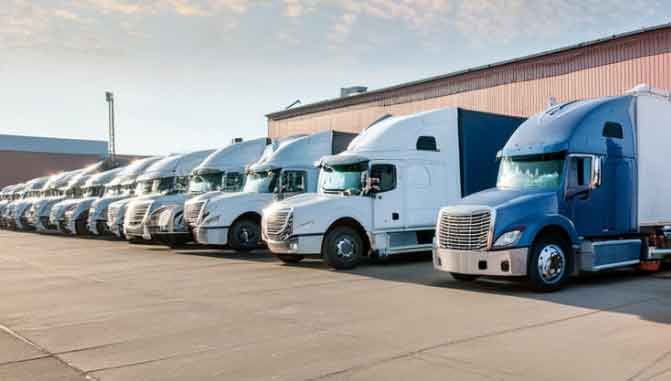Cargo Theft
Cargo Theft Prevention
Cargo theft is a significant challenge facing the transportation and logistics industry. It involves the unauthorized and unlawful removal of goods during transit, posing serious financial losses, safety risks, and supply chain disruptions. Shippers play a crucial role in safeguarding their cargo against theft and can benefit from working with reputable third-party logistics providers (3PLs) like Translogistics (TLI) that employ robust carrier vetting measures to ensure the safety of shipper freight.

What is Cargo Theft?
Cargo theft occurs when criminals target shipments during their journey from origin to destination. They exploit vulnerabilities in the transportation process, such as weak security practices, insufficient driver training, lack of trailer seals, or unsecured facilities. Thieves may seize entire trailers, pilfer specific items from shipments, or use deceptive tactics to divert cargo to unauthorized locations.

Impact of Cargo Theft
The consequences of cargo theft are multifaceted, affecting both the shipping industry and the broader economy. Shippers bear the brunt of financial losses due to stolen cargo, potential insurance premium increases, and damage to their reputation. Additionally, delayed deliveries disrupt supply chains, leading to increased costs and customer dissatisfaction. If raw material is stolen heading inbound, this can result in production delays and plant shut downs.
Verisk Analytics product CargoNet that was released in July of 2023 found that "supply chain risk events" increased by a staggering 57% y/y. 582 incidents have occurred totally $44,000,000 in stolen freight.
Keith Lewis, Vice President of Operations at CargoNet told Transport Topics, “We have clever criminals here, but it’s become more of a global problem in regard to the organized crime piece. When they steal by fraud, use the internet and use surrogates to do their dirty work that don’t know they’re involved in a crime, they can do it so much easier and so much faster. And now they can target and hit, with a bull’s-eye, high-value commodities.”
Criminals are posing as carriers and freight brokers, and convincing shippers to tender freight which enables them to fraudulently obtain cargo. The stolen freight is then turned over to legitimate carriers, and transferred to multiple facilities and carriers which essentially launders the commodity.

Preventing Cargo Theft:
Shippers can take proactive steps to reduce the risk of cargo theft and secure their freight during transit. Here are some effective preventive measures:
- Route and Timing Analysis: Shippers should analyze and strategize their shipping routes and timing to avoid high-risk areas and times when theft incidents are more likely to occur.
- Tracking Technology: Employ macro-point tracking through TLI to get real-time monitoring systems to keep a close eye on the cargo's location and identify any unauthorized deviations.
- Secure Facilities: Ensure that loading and unloading facilities are adequately secured, and access is restricted to authorized personnel only.
- Driver Training: Train drivers in cargo security protocols and educate them on recognizing suspicious activities during transit.
- Collaborate with Law Enforcement: Establish communication channels with local law enforcement agencies to report suspicious activities promptly.
- Secure Packaging: Utilize tamper-evident and secure packaging methods to deter opportunistic theft.
- Trailer Seals: Seal the trailer and write the trailer seal number on the bill of lading, to ensure the consignee upon receipt has a seal that matches the number that was listed from the point of origin.
It is worth advising that the most targeted freight is electronics and food. If you are routing valuable freight it is vitally important to partner with Translogistics Inc (TLI) to ensure it has proper cargo liability coverage and is routed with a vetted carrier.

Third-Party Logistics Providers (3PLs):
Partnering with reputable 3PLs like Translogistics (TLI) can significantly enhance cargo theft prevention efforts. These logistics experts employ rigorous carrier vetting procedures to ensure that only carriers with valid operating authority, a proven track record, and a commitment to security are entrusted with transporting valuable cargo.
- Carrier Vetting: TLI conducts thorough background checks on carriers, verifying their credentials, safety records, and adherence to industry standards before partnering with them.
- Risk Assessment: TLI evaluates the potential risks associated with each shipment, tailoring security measures accordingly to mitigate the chances of theft.
- Security Protocols: TLI implements robust security protocols for loading, transit, and delivery, minimizing vulnerabilities in the transportation process.
- Emergency Response: In the unfortunate event of theft attempts or security breaches, TLI has predefined emergency response plans to address the situation promptly which includes utilizing TIA WatchDog, Cargo Net, and promptly contacting law enforcement.
One of the key features of TIA WatchDog is its centralized reporting system. TIA members can confidentially report individuals or entities involved in the trucking industry who exhibit questionable or non-compliant behaviors. These reports could include safety violations, unethical practices, or any other concerns that might jeopardize the integrity of the industry.

Cargo Theft Summary:
The trucking industry as a whole is proactively combating cargo theft. As a shipper, there are numerous measures you can implement to mitigate risk. Most of these efforts revolve around educating shippers like yourself and our carrier vendors on the risks associated with cargo theft and the appropriate actions to take in the event of an incident. Utilizing sealed trailers can significantly reduce vulnerabilities. However, as technology continues to advance and cargo thieves become increasingly sophisticated and daring, there is only so much that can be done. To limit the impact of cargo theft, Translogistics recommends a multi-layered approach:
- Screen all employees, including drivers, warehouse personnel, and those with access to shipping information.
- Train employees, ensuring truck drivers receive comprehensive instruction on hijack awareness and prevention. Training safeguards the employee, trailer, tractor, cargo, and customers.
- Exercise prudence in selecting transportation partners, ensuring they share your security philosophy.
- Implement in-transit security measures. Cargo theft can be pre-planned or opportunistic. If you partner with Translogistics, we can add Macropoint GPS tracking to your load.
- Maintain vigilant surveillance. Include counter-surveillance in the duties of your security guards. Trucks and cargo are most vulnerable to theft when stationary.
- Leverage technology by installing alarm surveillance systems and responding to all alerts. Ensure adequate lighting for the perimeter, entrances, building doors, and windows. Vehicle and cargo tracking, immobilizers, and advanced security seals are available.
- Conduct audits of the supply chain and identify gaps in shipment protection. Investigate any missing or unaccounted inventory.
Cargo theft is a pressing concern that demands vigilant efforts from shippers to secure their freight during transit. By implementing preventive measures and partnering with trusted 3PLs like Translogistics (TLI) that prioritize cargo security through rigorous carrier vetting, shippers can significantly reduce the risk of theft and ensure smooth, secure transportation of goods. A collaborative approach between shippers and logistics providers like TLI is the most important key to safeguarding the supply chain and preserving the integrity of the industry.
Cargo Theft FAQ
What is the most stolen cargo?
Electronics remained the most frequently stolen product category for the third consecutive year, accounting for 22% of all thefts reported, albeit a 2% decrease from the previous year's figures. However, the category that witnessed the most significant surge was food and beverages, experiencing a staggering 66% spike compared to 2022, reaching 15% of total thefts. Following closely behind was the home and garden supplies category, constituting 14% of reported thefts.
Why is cargo theft spiking?
Strategic theft refers to the employment of deceptive tactics aimed at coercing individuals into relinquishing freight. These methods encompass identity theft, fictitious pickups, and double brokering scams, which have witnessed a significant escalation in cargo thefts over the past 18 months. Historically, periods of economic turmoil have been accompanied by an upsurge in freight theft incidents, a trend that permeates not only the truckload sector but also the less-than-truckload (LTL) networks.
What are the tactics of cargo theft?
The first category is straightforward cargo theft, wherein the freight is physically stolen from a location. This often involves an insider at the shipper's facility collaborating with a malicious actor who secures the load by renting power units and trailers or by scheduling a pickup with an unsuspecting driver unaware of the impending theft. The second form is strategic cargo theft, which employs deceptive means, including fraud and misleading information, to trick shippers into releasing loads to unlicensed and unscrupulous freight brokers. The third method involves the exploitation of technology, such as GPS blockers, to conceal the location of stolen containers or trucks.
What is the penalty for cargo theft?
Any infraction of 18 U.S.C. § 659 is classified as a felony punishable by up to ten years of imprisonment if the value of the stolen cargo, goods, chattels, money, or baggage exceeds $1,000. However, if the value of freight stolen is below $1,000, the maximum penalty is reduced to three years.
TLI Insights
Get the latest logistics insights and tips from TLI's award-winning team. Stay ahead in transportation planning.
Questions? Email us at marketing@shiptli.com



